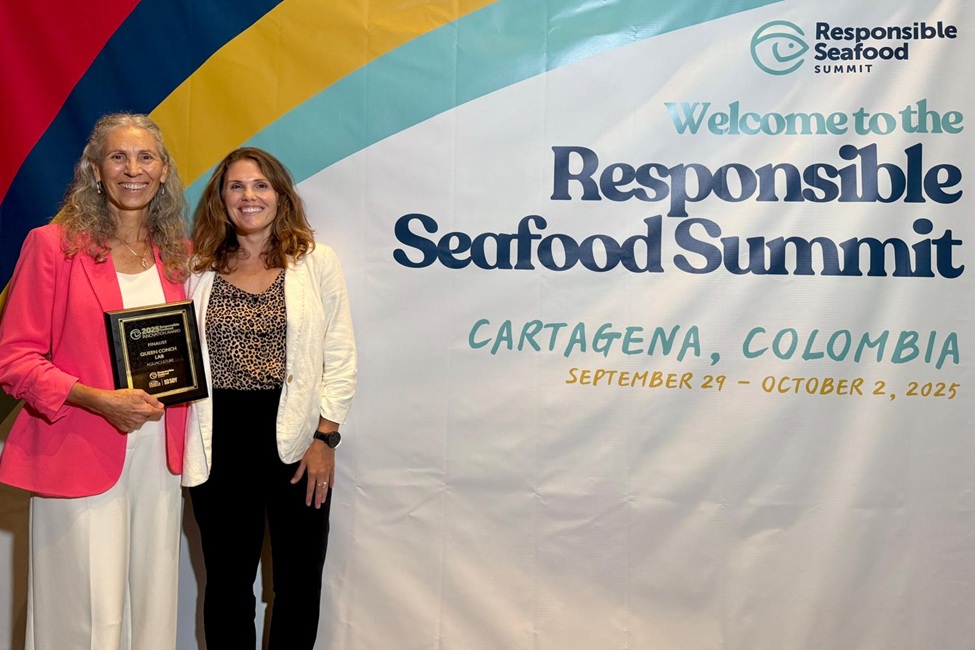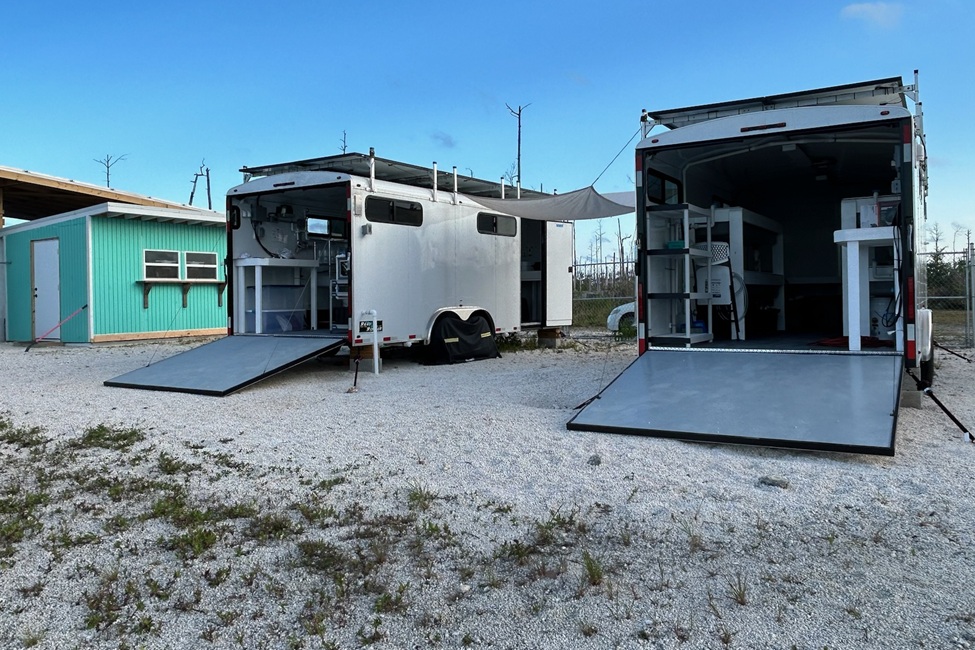FAU's Queen Conch Lab Receives Prestigious International Award

Megan Davis, Ph.D., (left) and Becky Holt, assistant director of the Queen Conch Lab, receiving the award during the Responsible Seafood Summit held in Cartagena, Colombia.
Award Snapshot: FAU Harbor Branch researchers have received the prestigious 2025 Responsible Seafood Innovation Award in Aquaculture from the Global Seafood Alliance for its Queen Conch Lab’s pioneering work in sustainable aquaculture. Led by Megan Davis, Ph.D., the research team has developed mobile lab hatcheries – trailer-based systems that support queen conch restoration in Caribbean communities lacking traditional infrastructure. These mobile hatcheries help rebuild wild conch populations while creating local opportunities in education, employment, and food security. FAU was recognized for its innovative, community-focused approach, which blends science, sustainability, and cultural preservation to address the urgent decline of a species vital to the region’s ecosystems and economies.
The Florida Atlantic University Harbor Branch Oceanographic Institute’s Queen Conch Lab, led by research professor Megan Davis, Ph.D., has been named the recipient of the 2025 Responsible Seafood Innovation Award in Aquaculture from the Global Seafood Alliance (GSA).
The award honors the Queen Conch Lab’s development of mobile lab hatcheries designed to help restore the threatened Caribbean queen conch. These self-contained, trailer-based hatcheries bring advanced aquaculture capabilities to coastal communities across the Caribbean, many of which lack traditional infrastructure. This innovation is not only helping to rebuild wild conch populations but is also generating opportunities in education, employment and food security throughout the region.
GSA is an international nonprofit organization dedicated to advancing responsible seafood practices through education, advocacy and third-party certification. GSA works across the seafood supply chain – from aquaculture to wild fisheries – to promote environmental responsibility, social accountability, food safety and animal welfare. Through its standards, events and media platforms, the organization helps ensure that seafood is produced in ways that are sustainable and ethically managed.
This prestigious award was recently presented to Davis and Becky Holt, assistant director of the Queen Conch Lab, during the Responsible Seafood Summit held in Cartagena, Colombia, and recognizes transformative efforts in sustainable aquaculture that contribute to the future of responsible seafood production globally.
The queen conch is a culturally and economically vital species that has long sustained Caribbean communities through its role in nutrition, trade and tradition. However, due to decades of overfishing and habitat loss, the species has seen significant declines. In 2024, NOAA listed the queen conch as ‘threatened’ under the Endangered Species Act. Current data suggests that commercial fishing in The Bahamas could become unsustainable within the next 10 to 15 years.
Recognizing the urgency of this crisis, FAU’s Queen Conch Lab set out to pioneer a scalable, science-based solution that integrates restoration, education and community engagement.
At the heart of this solution is the mobile lab hatchery – a laboratory built inside a custom trailer, similar in size to a food truck, outfitted with advanced aquaculture systems including solar power, aeration, flow-through and recirculating saltwater systems, and algae and conch cultivation setups. These units are designed to be transported to remote areas and connected directly to local seawater sources, making them fully operational hatcheries that require no permanent facilities.
Since the first trailer was deployed to Great Exuma, The Bahamas in 2022, eight additional hatcheries have been launched in Puerto Rico, Jamaica, The Bahamas and Florida, with more in development for deployment to other nations including Turks and Caicos and St. Vincent and the Grenadines.
These mobile hatcheries are capable of producing up to 2,000 juvenile queen conch annually, supporting both ecosystem restoration and sustainable seafood initiatives. However, their impact goes far beyond biological output. Each hatchery becomes a local hub for science education, job training and community empowerment. Through close partnerships with local organizations such as Blue Action Lab in Grand Bahama, Conservación ConCiencia and Villa Pesquera de Naguabo in Puerto Rico, University of West Indies in Jamaica, and other grassroots conservation and fishing groups – the Queen Conch Lab model ensures that local expertise and cultural knowledge are integrated into every stage of the process.
“This recognition from the Global Seafood Alliance is an incredible milestone for our team and our many community partners,” said Davis. “It reflects the idea that science can be mobile, accessible and rooted in local collaboration. What started as a simple concept – putting a hatchery in a trailer – has become a powerful tool for helping to restore queen conch and supporting the culture, food security, seagrass ecosystems and identity of Caribbean communities.”
The GSA’s Responsible Seafood Innovation Award highlights innovations that not only address pressing environmental challenges but also serve as catalysts for broader change in how seafood is produced, consumed and valued.
“The work coming out of our Queen Conch Lab is extraordinary – not just in its scientific merit, but in its human impact,” said James Sullivan, Ph.D., executive director of FAU Harbor Branch. “The mobile hatcheries represent a new paradigm in aquaculture – bringing the lab to the people, training the next generation of marine scientists, and building resilience in ecosystems and economies alike. This is exactly the kind of bold, collaborative and community-driven work that sustainable seafood needs right now. It’s setting a global standard for what responsible aquaculture can and should look like.”
Looking ahead, the Queen Conch Lab continues to pursue its long-term goal of establishing a community-based queen conch farm in every Caribbean country. The lab is also expanding its training programs, educational outreach, and scientific research in collaboration with a growing network of local and international partners.
“As Caribbean nations confront the dual challenges of environmental degradation and economic vulnerability, our Queen Conch Lab offers a hopeful, actionable model for restoration and resilience,” said Davis.

These self-contained, trailer-based hatcheries bring advanced aquaculture capabilities to coastal communities across the Caribbean, many of which lack traditional infrastructure. (Photo credit: Megan Davis, Ph.D.)
-FAU-
Latest Research
- After Cancer: Study Explores Caring-Healing Modalities for SurvivorsResearch from FAU's Christine E. Lynn College of Nursing highlights how caring-healing methods like mindfulness can ease distress and build resilience in cancer survivors.
- FAU Researchers 'Zoom' in for an Ultra-Magnified Peek at Shark SkinWhat gives shark skin its toughness and sleek glide? Tiny, tooth-like denticles. Researchers used electron microscopy to reveal how these structures shift with age, sex, and function in bonnethead sharks.
- FAU Lands $3M Federal Grant to Prevent Substance Use in At-risk Youth"Rising Strong" will support more than 3,000 South Florida youth with trauma-informed, evidence-based prevention, empowering vulnerable populations to build resilience and choose substance-free futures.
- FAU Research: Logistics Expansion Slows as Transportation Prices DropThe Logistics Managers' Index had the lowest overall reading since March as the supply chain reacts to economic uncertainty, according to researchers from Florida Atlantic University and four other schools.
- World's First Bench-to-Bedside MRI, Focused Ultrasound System UnveiledThe newly expanded FAU NeuroInnovate Center is the first in the world to integrate advanced MRI and focused ultrasound technologies into a single, unified platform for both preclinical and clinical research.
- Beyond the Pink Ribbon: Combating Breast Cancer in Younger WomenFAU researchers are investigating rising breast cancer in younger women. Four young survivors' stories highlight missed signs, emotional toll, and the urgent need for earlier detection and evidence-based care.






